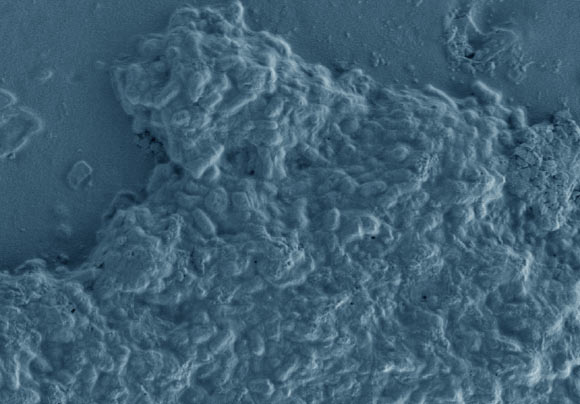A team of scientists from Germany, Taiwan and the United States has demonstrated that antibodies to a toxin secreted from Cutibacterium acnes bacteria can reduce inflammation in acne lesions.

Scanning electron micrograph of Cutibacterium acnes. Magnification – 20,000x. Image credit: Yvonne Achermann et al, doi: 10.1128/CMR.00092-13.
Cutibacterium acnes, formerly Propionibacterium acnes, is a Gram-positive skin bacterium and predominates (>60% of total bacteria) the facial skin in humans.
Nearly everyone hosts this species, which makes up almost half of the total skin microbiome.
Overgrowth of Cutibacterium acnes has been linked to acne vulgaris, a skin disease afflicting more than 85% of teenagers and over 40 million people in the United States.
Current medications are often insufficient and can cause difficult-to-tolerate side effects ranging from skin dryness and irritation, to depression and increased rates of birth defects.
An acne vaccination could circumvent potential adverse effects of topical or systemic retinoids and antibiotics, the current treatment options.
This vaccine would be the first to target bacteria already in human skin, instead of invading pathogens.
“Current treatment options are often not effective or tolerable for many of adolescents and adults who suffer from this multi-factorial cutaneous inflammatory condition,” said study lead author Dr. Chun-Ming Huang, a researcher in the Department of Dermatology at the University of California, San Diego and the Department of Biomedical Sciences and Engineering at National Central University in Taiwan.
“New, safe, and efficient therapies are sorely needed.”
In the study, Dr. Huang and co-authors demonstrated that Christie-Atkins-Munch-Peterson (CAMP) factor, a virulence factor secreted from Cutibacterium acnes, is a main source of inflammation in acne vulgaris.
They then explored in mice and ex vivo in human skin cells whether they could inhibit inflammation by employing antibodies to neutralize this virulence factor.
The findings show that the application of monoclonal antibodies to CAMP 2 factor did indeed decrease the inflammatory response.
“Once validated by a large-scale clinical trial, the potential impact of our findings is huge for the hundreds of millions of individuals suffering from acne vulgaris,” Dr. Huang said.
The results appear in the Journal of Investigative Dermatology.
_____
Yanhan Wang et al. The Anti-Inflammatory Activities of Propionibacterium acnes CAMP Factor-Targeted Acne Vaccines. Journal of Investigative Dermatology, published online June 30, 2018; doi: 10.1016/j.jid.2018.05.032







